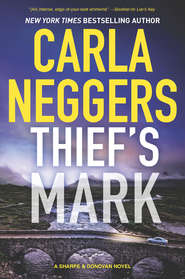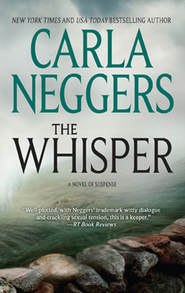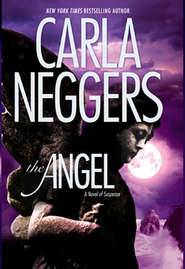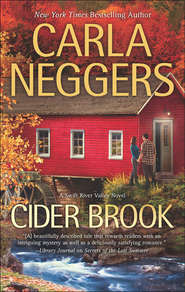По всем вопросам обращайтесь на: info@litportal.ru
(©) 2003-2024.
✖
Kiss the Moon
Автор
Год написания книги
2019
Настройки чтения
Размер шрифта
Высота строк
Поля
Her voice seemed to go nowhere in the quiet, still, late afternoon air. Maybe she’d heard a deer or a moose, even a bear venturing out of hibernation.
Yep. Best to get on home.
Her water-soaked socks squished inside her day hikers. No blisters yet. She was lucky. She hadn’t bothered with boots or snowshoes, never imagining she’d end up lost. A little lost was one thing. That she could manage. But she was a lot lost.
Then, there in front of her, at her feet, was a melting trail of footprints. Not moose or deer or even bear, but human prints. And not her own. They were big. Probably male. She pivoted and stared toward the opposite hill, unable to make out the wreckage from her position. The snow, the gray rocks, the gray trees, the gray sky. The heap of plane tubing was gone, as if it had been a mirage.
The footprints ran down the hill to the left of the way she’d come, weaving among maple and oak and hemlock, even, unhurried. They had to be relatively fresh prints. The warm temperatures had barely melted them, and the last snow had been just two days ago, four inches that freshened the landscape and heartened the skiers who loved to see March stay a lion for as long as possible.
But who could have ventured out here, possibly have seen the wreckage and not mentioned it?
“Bubba Johns.”
Of course. He would have no interest in a lost plane.
Penelope could feel some of the tension ease out of her. She wasn’t afraid of Bubba. He was the town hermit, a recluse who had a shanty on the edge of Sinclair land—technically on Sinclair land, but no one had made an issue of it in the twenty years since he’d set up housekeeping there.
“Bubba!” she called, her voice dying in the ravine. There was no echo. “Bubba, it’s me, Penelope Chestnut!”
She could almost feel his ancient, some said crazy, eyes on her, a frosty gray that went with his unkempt white beard and scraggly white hair, his tall, rangy body. Sinclairs or no Sinclairs, it was Bubba who owned these hills and had for years. Penelope’s parents had warned her as a child to stay off Sinclair land, not because she was trespassing, but because she might run into Bubba Johns. But at ten years of age, she’d found herself out in the hills, exploring on her own, pretending, fantasizing, not realizing until it was nearly dark that she was lost. Bubba had materialized out of nowhere and silently led her home. She had been terrified, and her active imagination had conjured up images of Little Red Riding Hood meeting up with the big bad wolf. She half expected Bubba to drop her over a cliff or toss her onto a fire even as she’d followed him home, chattering at him as if she’d known him all her life. Without ever speaking, he’d left her at the end of her parents’ driveway and disappeared, not waiting for thanks or an invitation for coffee and cake. Her parents hadn’t seemed too sure they should believe their only daughter’s story about the silent hermit who’d seen her home.
Bubba Johns was as much a part of the landscape as the moose, deer, hawks and chipmunks, and like everyone else in Cold Spring, Penelope left him to his chosen life of isolation and solitude.
She turned and continued on her way, feeling the sun sinking in the west even as the sky melted into a pink so deep and dark and beautiful it made her want to lie on the snow and stare at it. But she kept walking, her head spinning, her legs leaden, her mind full of thoughts of Colt Sinclair and Frannie Beaudine buried in their twisted metal grave and Bubba Johns out there in the gathering darkness, waiting, perhaps, to see if once again he needed to lead her home.
Wyatt Sinclair gave up on sleep and kicked off his blanket sometime before dawn. He didn’t know the exact time because Madge, his ex-lover, had insisted on removing the clock radio from his nightstand. It was bad chi, she’d said. Apparently he was a walking time bomb of bad chi. That was spooky enough, but then she did his astrological charts using some computer program. She’d plugged in the date, time and place of his birth, and out popped stuff that had compelled her to pack up.
“I have to move out,” she’d told him, whipping things into her suitcase. “There’s just too much negative energy around you. You’re—well, to be very straightforward with you, Wyatt, you’re one scary son of a bitch.”
He’d grinned. “You needed a computer to tell you that?”
Ten minutes later, she was out the door. She’d left the cat. Allergies.
He stumbled out to his living room, tripping over the cat en route. It got up and did its cat-stretching thing. It wasn’t much of a cat. Short gray hair, yellow eyes, lean. Bad tempered. Madge called him Sarsaparilla, but Wyatt thought that was a hell of a name for a cat and just called him Pill.
A New York apartment, a cat, an ex-lover like Madge. No wonder he had sleepless nights.
He flipped on lights, put on coffee, poured some orange juice and clicked the remote. “Headline News” came on. He flopped on his couch, noticing on the TV clock that it was four-eighteen. Early, especially for New York. The city was strangely silent at this time of day, at least from the vantage point of his fourth-floor upper east side apartment.
He liked New York on and off. His mother, the first of Brandon Sinclair’s three wives, had raised him there through eighth grade. Then the Sinclairs had taken over, and it was off to prep school, Dartmouth and Wharton. He’d endured, struck off on his own for a while and returned to the city of his childhood eighteen months ago. Who’d have ever thought.
If Hal hadn’t died, Wyatt supposed he might still be tallying new bird and plant species in remote parts of Australia and South America. But Hal had died, and Wyatt had come home.
He stared at the reporter on the screen and yawned, not out of fatigue, he realized, but boredom. Stress was not a factor in his intermittent insomnia. He had money, food, lodging and—dear God, it was true—a good job. He would be at his desk on Wall Street in another five hours.
His office had a view of the harbor. It was something.
He watched a commercial pushing laxatives, then a report about the latest scandal in Washington, and he was about to flip to “Nick at Nite” when the anchorwoman started in on her next news item.
“The solution to one of the more tantalizing mysteries of the past half-century may be at hand. A New Hampshire woman claims she’s found the small plane adventurers Frannie Beaudine and Colt Sinclair were flying the night they disappeared.”
Wyatt sat straight and turned up the volume.
The woman was named Penelope Chestnut, she lived in Cold Spring, and she had stumbled on the wreckage while she was out hiking on Sunday, the report continued. She would be leading local authorities to the crash site today, Tuesday, for verification.
Contacted at his vacation home in St. Croix, Brandon Sinclair had declined comment.
Wyatt wasn’t surprised. His uncle’s disappearance was the most enduring and mysterious scandal involving a Sinclair, if hardly the only one. Or the most recent. Hal’s death and Wyatt’s near death—and presumed culpability—in Tasmania had garnered their share of headlines. His father maintained his only son was a throwback to previous generations of Sinclairs, who had been adventurers and daredevils since Roger Sinclair had taken on the English as a privateer in the American Revolution. Naturally, he’d made a fortune, pissed off friend and foe alike and died young.
“Headline News” put up the famous picture of Frannie and Colt taken the night of their ill-fated flight. Wyatt was struck by how young they looked. Frannie was from Cold Spring, a captivating mix of daring pilot and self-taught art historian whose exploits, intelligence and beauty had drawn her rich lover’s eye. They’d cut out of a reception at the Metropolitan Museum of Art, took off in Colt’s Piper Cub and were never seen again. No trace of them or their plane was ever found.
Until Sunday, Wyatt thought, wishing they’d put up a picture of Penelope Chestnut instead of his uncle and Frannie Beaudine. He was generally an excellent judge of character, and if he could see what she looked like, he would be better able to assess if this was a hoax. But there was no picture, no footage, even, of Cold Spring, New Hampshire.
He debated calling his father. Colt’s disappearance was still a raw wound that infected everything Brandon Sinclair did, including raise his only son. He seldom talked about his brother, brushed off questions Wyatt would ask. Wyatt wasn’t sure whether his father’s reticence stemmed from the lingering pain and grief of losing his only brother or from embarrassment. Even after forty-five years, Colt could still attract national headlines.
To his credit, Brandon had worked hard to change the Sinclair way of doing things. He wanted to preserve their spirit of scholarship, exploration and adventure but without the penchant for scandal and premature death. He was determined his brother’s example would not extend to another generation. Colt would be the last Sinclair whose recklessness and zest for adventure would leave behind mourning parents, wives, children—and younger brothers.
Not that Brandon had ever told Wyatt he’d loved his older brother, missed him, felt hurt and betrayed because he’d abandoned him for Frannie Beaudine. But if he knew nothing else about his family, Wyatt knew that love was never enough for a Sinclair. That was their abyss. It was impossible to fill with money or adventures. No matter how many lions they shot or mountains they climbed or discoveries they made, the abyss remained unfilled.
He wondered when his father had realized his only son was that way, too. Another Sinclair destined for notoriety and adventure.
But no more. After the disaster in Tasmania, Wyatt had opted for the safe path. A desk, a suit, a job putting his MBA to use. He’d already thrown his trust fund in his father’s face, so there wasn’t that. But there was plenty of money. Even a disinherited Sinclair was good at making money.
The cat jumped up on his lap and started pawing, and Wyatt shut off the television and listened to Manhattan awaken on a dreary March morning. Garbage trucks, cabs, dog walkers, hospital workers, a siren off in the distance. He patted Pill, although he didn’t much like cats, and he told himself that Penelope Chestnut and her discovery in the woods above Lake Winnipesaukee weren’t his problem. His only problem was scrounging up enough energy and interest to get to work for nine o’clock.
By nine-fifteen Jack Dunning was standing in front of Wyatt’s office window high above New York harbor. Jack was a tall, rangy, sandy-haired man dressed in cowboy boots and jeans. Wyatt regarded him without comment. A Brooklyn native gone Texan. He’d worked as a private investigator in Dallas for years, apparently wore out his welcome and was back in New York. His chief client was Brandon Sinclair, a man not only very rich but also very suspicious, determined to protect himself, his wife, his two ex-wives, his son and his two young daughters from scoundrels, kidnappers, con men and lunatics. Jack seemed perfectly willing to oblige. As soon as he made enough money, he always said, he planned to buy a ranch in west Texas and retire. New York made him itch, and the women wore too damned much black.
He glanced at Wyatt. “Nice view.”
Wyatt smiled. “The Statue of Liberty reminds me of the virtues of tolerance.”
“Reminds me of the dangers of being a sucker.”
Wyatt couldn’t tell if he was serious. In his eighteen months back in New York, he’d come to believe Jack Dunning was a man not nearly as uncomplicated as he liked to pretend. His angular features and dead gray eyes made him difficult to read. He could be fifty—he could be sixty. It was impossible to tell. And Wyatt had no real desire to know. Jack worked for his father. If he was here, it was because Brandon Sinclair wanted him to be here.
“You heard about your uncle’s plane?” Jack asked.
“I caught it on the morning news.” Wyatt didn’t say how early that morning. Dunning would regard a sleepless night as a weakness and file it away as something he had on his employer’s eldest child.
“Then you haven’t heard the latest. The woman who said she found the plane—this Penelope Chestnut—she’s changed her mind. Says it was a mistake. She was hypoglycemic and on edge because she was lost.”
“Lost?”
“That’s how she found the site in the first place—she was out hiking on Sunday afternoon and got lost. Her folks were organizing a search party when she found her way out on her own. Claims she went back yesterday afternoon and saw it wasn’t a plane but just an old dump site, probably from the turn of the century.”
Wyatt rolled that one around in his mind. A mistake. Not what he’d expected from Penelope Chestnut, although he had no reason to expect anything. “So no Colt and Frannie, after all.”
“That’s what she says. Here’s the thing.” Jack turned from the window. There was no indication he felt out of place in the elegant wood-paneled Wall Street office, which Wyatt had leased furnished, down to the brass lamps and slate blotter. If he were to play the venture capitalist, he needed a robber baron office.











